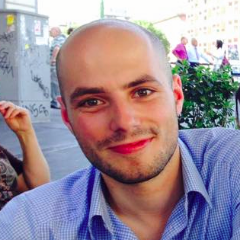There are few opportunities to hear live performances of Verdi’s I Lombardi alla prima crociata, but the opera has returned to Turin’s Teatro Regio after 93 years. For the occasion, the Regio has opted for a new production from Stefano Mazzonis di Pralafera, Artistic Director of the Opéra Royal de Wallonie, and sourced a starry cast. That it has also enlisted the conductor Michele Mariotti, who is renowned for his interpretations of early Verdi, provides added allure.
The work itself perhaps has less inherent draw. A convoluted plot pits Pagano against his brother Arvino, in a typical tale of vengeance here taking place to the backdrop of the crusades. Attempting to kill Arvino, Pagano murders their father instead, before we are transported from Milan to Jerusalem, for a denouement provided by the lovers Oronte and Giselda.
The director presented the story clearly enough, providing pseudo-Lombard buildings for the architecture for the Milan of Acts One and Two, and expanses streaked with minarets for the Jerusalem of Acts Three and Four. Apart from that, there is not much going for this production. Having medieval towers slant on hinges to represent upheaval, an awkward piece of abstractionism, felt at odds with the mainly traditional production. So did the female chorus members, who filtered onstage in wiry headgear and costumes that looked vaguely Far-Eastern. This production was too prosaic to provide much atmosphere. That more has not been done with the sets is surprising, considering di Pralafera seems to have expended little energy on directing the singers. They remain largely static throughout, and are over-reliant on stock Italian gestures.
The start of the opera, featuring throngs outside Milan’s Sant’Ambrogio Basilica, was a rare moment in this performance for dramatic appeal. The scene takes place before the main singers in this second cast get into their stride, which is when things took a turn for the worse. Giuseppe Gipali’s voice has plenty of penetration, but more charisma was required if he was to convincingly convey the swashbuckling Oronte. Soprano Maria Billeri’s Giselda was, if anything, less convincing: her voice was unfocused and spread thinly at the top, making for uncomfortable listening in the showpiece aria “Non fu sogno”. Marko Mimica, replacing Alex Esposito, made for a stirring Pagano, and there were solid performances from Vladimir Jurlin’s Acciano and Gabriele Mangione’s Arvino. Nevertheless, the big first cast names of Angela Meade and Francesco Meli were telling absences in this performance.
Mariotti’s account was closer to routine than some of the trailblazing performances he has given of late, but it was engaging and was enough to salvage this performance. The conductor offered taut rhythms when required, but, as often with Mariotti, there was also lovely elasticity in the tempi. The orchestral depiction of the battle scene, which crackled and snarled, was suitably dramatic, and the chorus did a fine job with their off-stage contributions, which floated into the auditorium to provide Oriental colour. That provided something, at least, to enjoy in this largely dispiriting performance.




